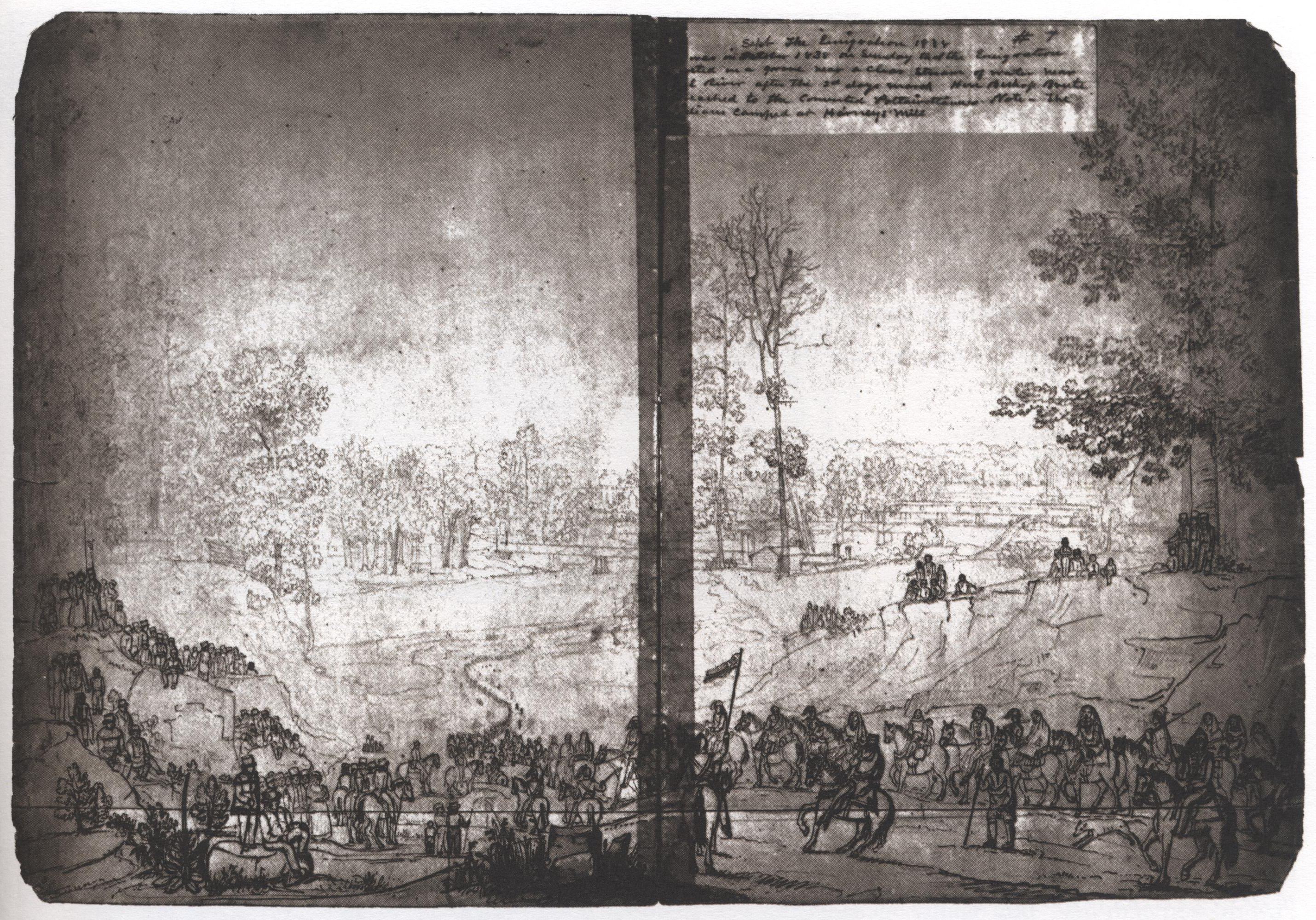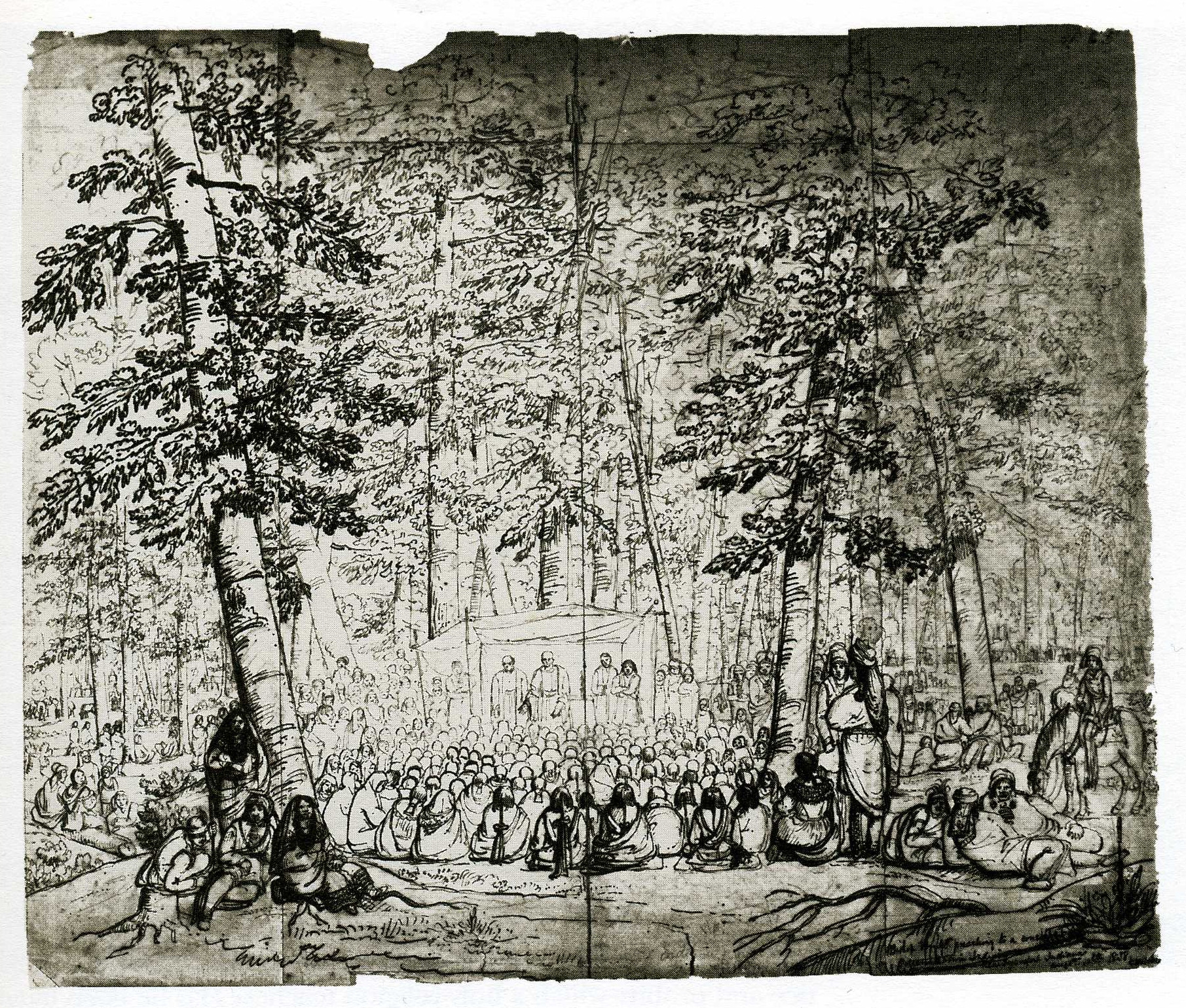In 1838, the Potawatomi Indians in the state of Indiana were forcibly removed from their ancestral homelands by order of the U.S. government. The 859 Potawatomi who started the journey traveled across Indiana, Illinois, Missouri and finally Kansas before finally arriving at their intended destination. The loss of life, 41 in total, resulted in the removal becoming known as the Potawatomi Trail of Death. Below are excerpts from a journal of one of the trail’s participants, William Polke.
Wednesday, 5 Sept. 1838
“During the night of the 4th at the encampment at Chippeway, twenty persons affected their escape—stealing two horses from the Indians remaining behind, and have not since been heard of.
“Fifty one persons were found to be unable to continue the journey, the means of transportation not being at hand—they were therefore left, the most of them sick, the remainder to wait upon them. Proceeded on our route, and reached at half past 12, at noon, the point determined upon as the location of our second encampment, a distance of nine miles from the encampment of the day before. The scarcity of water in the country again retarded the progress of the emigration—the distance being either too great or too short between the watering places. A child died on the evening of this day, and was buried on the morning. A child was also born during our encampment. A party of three Indians joined us today shortly after coming into camp. Subsistence generally consisting of beef and flour, and that very difficult to acquire—having in most cases to transport it from Logansport, a distance from the furthest point of 46 miles.”

Sunday, 9 Sept. 1838
“Physicians came into camp today, and reported three hundred cases of sickness, generally of a temporary character, and which they are of opinion, may be removed by a two-day course of medicine. A kind of medical hospital has been erected today, which is likely to facilitate the course of medical regime proposed by the physicians. A child died today. The priest formerly attached to the Catholics among the Pottawattamies asked and obtained leave to say mass today and perform the ceremonies of his church in camp. The rites are now being performed.”
“This Evening Sidney Williams and Wm. T. Polke, who had been dispatched in pursuit of the Indians, who escaped from Chippeway, returned, having reconnoitered the villages and cornfields on the reserve without receiving and intelligence of the fugitives. They brought into camp three Indian horses which they had found on the road. A child died since dark.”
Friday, 14 Sept. 1838
early hour and proceeded at a quick pace on our journey—passing over a dry and seemingly unhealthy portion of the country. Our party continues to mend in health. Occasionally however, and indeed not unfrequently, persons thro’ weariness and fatigue take sick along the route. This occupies much of our time. We place them in the wagons which are every day becoming more crowded and proceed.”
“Reached our camp ground near Williamsport at nine p.m. As we advance farther into the country of the prairies water becomes more scarce—the streams are literally dried up, and we have reason to fear that unless soon refreshed with rain, our future marches will be attended with much pain, and suffering. To-day we made 18 miles. Two deaths took place this evening.”

Saturday, 15 Sept. 1838
“Early on this morning we were on our way, and travelled without interruption unit 12 o’clock. When we arrived at an unhealthy and filthy looking stream, at which, from the reports of the citizens of the country, we were forced to encamp. The young men among the Indians during the afternoon, to the number of twenty-five, were permitted to go on a hunting excursion—a permission which they have for some time seemed to covet. We travelled today about 10 miles. Two small children died along the road.”
Saturday, 22 Sept. 1838
“At 8 o’clock we left our encampment and entered the prairie at Sidney. The day was exceedingly cold. The night previous had brought us quite a heavy rain, and the morning came in cold and blustry. Our journey was immediately across the prairie, which at this point is entirely divested of timber for sixteen miles. The emigrants suffered a good deal, but still appeared to be cheerful. The health of the camp continues to improve—not a death has occurred to-day, and the cool bracing weather will go far towards recruiting the health of the invalids.”
“A wagoner was discharged today for drunkenness. Dissipation is almost entirely unknown in the camp.”
“Tonight, however, two Indians were found to have possessed themselves of liquor and become intoxicated. They were arrested and put under guard. Some six or eight persons were left at Davis’s Point this morning, for want of the means of transportation. They came in this evening. We are at present encamped at Sidoris’s Grove, sixteen miles distant from Sidney. Water quite scarce.”
